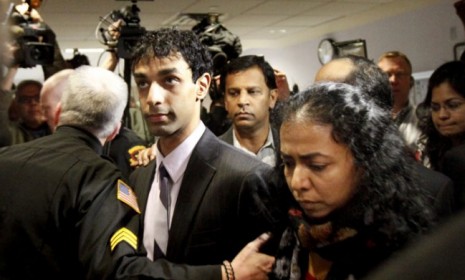Rutgers' webcam spying case: Was the jury right to call it a hate crime?
Dharun Ravi is found guilty and faces 10 years in prison for tormenting gay roommate Tyler Clementi, who killed himself by jumping off the George Washington Bridge

A free daily email with the biggest news stories of the day – and the best features from TheWeek.com
You are now subscribed
Your newsletter sign-up was successful
On Friday, a jury found former Rutgers University student Dharun Ravi guilty of hate crimes for surreptitiously using a webcam to watch his freshman dorm roommate's sexual encounter with another man. The roommate, Tyler Clementi, later jumped to his death from the George Washington Bridge in New York City, after he discovered that Ravi had mockingly told other students about what he had seen. Clementi's suicide put a national spotlight on the bullying of gay teens, and launched several new efforts to prevent such tragedies. However, the complicated and emotionally fraught trial that followed sparked a controversy of its own: Is Ravi just an immature kid who acted out of thoughtlessness rather than malice? Or, by targeting Clementi for being gay, did he commit a hate crime? Ravi now faces up to 10 years in prison and possible deportation to his native India. He will be sentenced on May 21. Is the verdict just?
Yes. Hate crime laws serve a purpose: Tough hate crime laws recognize "the deep wounds inflicted when violence is motivated by prejudice," says Hayley Gorenberg, the director of gay-rights group Lambda Legal. The case against Ravi "has focused the nation on how critical it is that we ensure every young person can feel safe and proud," and the jury rightfully understood that "bias crimes" such as Ravi's "do not require physical weapons like a knife in one's hand" to cause terrible pain and suffering.
"Ex-Rutger's student Dharun Ravi found of invasion of privacy in spycam trial"
The Week
Escape your echo chamber. Get the facts behind the news, plus analysis from multiple perspectives.

Sign up for The Week's Free Newsletters
From our morning news briefing to a weekly Good News Newsletter, get the best of The Week delivered directly to your inbox.
From our morning news briefing to a weekly Good News Newsletter, get the best of The Week delivered directly to your inbox.
No. And it won't stop bullying of gays: "The possible punishment... seems to far outweigh the crimes," says Maura Kelly at Britain's Guardian. Is Ravi "immature, overprivileged, and offensive?" Certainly. But he's not a murderer. Instead of seeking justice for Clementi's death by "ruining the life of another impressionable young man," we should focus on the real source of homophobia: "A society that is still far too accepting" of anti-gay behavior. Instead of harshly punishing Ravi, let's all start telling anti-gay "loudmouths" that "their hateful language" is unacceptable. If someone had done that for young Ravi, "this sad story would've had a different ending."
"The Dharun Ravi verdict does little for other Tyler Clementis"
Maybe the jury can still thread the needle: If Ravi is sent to jail for 10 years, says Jay Michaelson at Newsweek, we'll be unfairly punishing him for a prejudice that "is no different from what millions of other 18-year-olds think, and feel, all the time." Ravi will essentially be acting as a "scapegoat for all of us." At the same time, a gentler verdict "would send the message that it's OK to bully gay kids, embarrass them, and drive them to despair or worse." Ideally, the jury will give Ravi a light sentence for his hate crime, which would acknowledge his guilt while sparing his future.
"Is it fair to punish Dharun Ravi because Tyler Clementi died?"
A free daily email with the biggest news stories of the day – and the best features from TheWeek.com